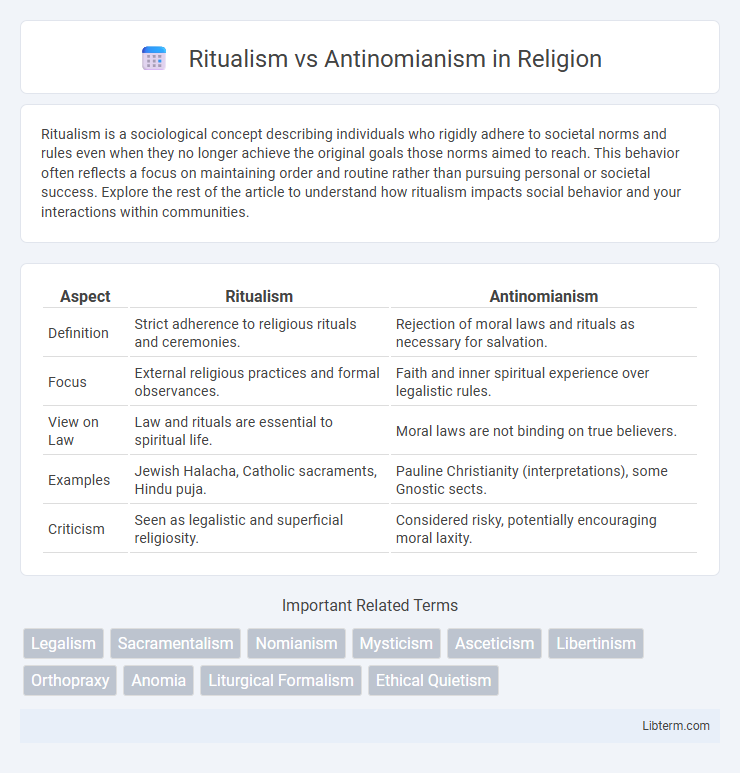Ritualism is a sociological concept describing individuals who rigidly adhere to societal norms and rules even when they no longer achieve the original goals those norms aimed to reach. This behavior often reflects a focus on maintaining order and routine rather than pursuing personal or societal success. Explore the rest of the article to understand how ritualism impacts social behavior and your interactions within communities.
Table of Comparison
| Aspect | Ritualism | Antinomianism |
|---|---|---|
| Definition | Strict adherence to religious rituals and ceremonies. | Rejection of moral laws and rituals as necessary for salvation. |
| Focus | External religious practices and formal observances. | Faith and inner spiritual experience over legalistic rules. |
| View on Law | Law and rituals are essential to spiritual life. | Moral laws are not binding on true believers. |
| Examples | Jewish Halacha, Catholic sacraments, Hindu puja. | Pauline Christianity (interpretations), some Gnostic sects. |
| Criticism | Seen as legalistic and superficial religiosity. | Considered risky, potentially encouraging moral laxity. |
Defining Ritualism and Antinomianism
Ritualism emphasizes strict adherence to established religious ceremonies and rites as essential means of spiritual practice and moral discipline. Antinomianism, conversely, rejects the binding nature of moral laws, asserting that faith alone absolves believers from legalistic or ritual obligations. These contrasting approaches highlight the tension between external religious observance and internal spiritual freedom within theological discourse.
Historical Roots and Development
Ritualism and Antinomianism emerged as contrasting theological movements during the Protestant Reformation, with Ritualism emphasizing strict adherence to established religious rites rooted in Catholic tradition. Antinomianism developed as a radical critique, rejecting the binding nature of moral law in favor of faith and grace, gaining prominence through figures like Martin Luther and later Puritan dissenters. Both movements influenced the evolution of Christian doctrine by challenging the balance between law, faith, and practice in historical religious contexts.
Key Beliefs and Practices
Ritualism emphasizes the strict adherence to established religious rites and ceremonies as a means to achieve spiritual discipline and divine favor, often valuing tradition and external observance. Antinomianism rejects the necessity of following moral laws or rituals, asserting that faith alone grants salvation and that believers are freed from legalistic constraints. While ritualism focuses on outward religious practices to maintain order and holiness, antinomianism prioritizes inner faith and grace, challenging institutionalized norms.
Scriptural Foundations
Ritualism emphasizes strict adherence to religious ceremonies and prescribed laws based on passages like Leviticus 23 and Matthew 5:17, highlighting the importance of maintaining established rituals as a means of honoring God. Antinomianism, rooted in Scriptures such as Romans 6:14 and Galatians 5:18, teaches that believers are freed from the obligation to follow Old Testament laws because of the grace received through faith in Christ. The tension between these views reflects differing interpretations of the role of Mosaic Law versus grace and faith in the Christian life.
Major Influencers and Movements
Major influencers of ritualism include figures like Edward Bouverie Pusey and John Henry Newman of the Oxford Movement, who emphasized the importance of liturgical practices and sacraments within Anglicanism. In contrast, antinomianism was strongly advocated by radical reformers such as Martin Luther and later by figures like Anne Hutchinson, who challenged legalistic religious norms and promoted faith as the sole basis for salvation. These movements shaped significant theological debates during the Reformation and the 19th-century Anglican revival, influencing modern Christian liturgical and doctrinal practices.
Cultural and Social Impact
Ritualism reinforces cultural identity and social cohesion by emphasizing structured practices and communal participation, often preserving traditional values within religious communities. Antinomianism challenges established norms by rejecting formal rituals and moral laws, fostering individual autonomy and sometimes sparking social tension or reform movements. The clash between ritualistic conformity and antinomian freedom shapes societal debates on authority, morality, and cultural continuity.
Ritualism vs Antinomianism: Major Differences
Ritualism emphasizes strict adherence to religious rituals and ceremonies as a means of maintaining spiritual discipline and order. Antinomianism rejects the necessity of following religious laws or rituals, arguing that faith alone is sufficient for salvation and moral conduct. The major difference lies in Ritualism's focus on external practices versus Antinomianism's emphasis on internal faith and the dismissal of established rules.
Criticisms and Controversies
Ritualism faces criticism for emphasizing external religious practices over genuine spiritual transformation, often being accused of legalism and superficial piety. Antinomianism is controversial for rejecting moral law as unnecessary for salvation, leading critics to argue it promotes moral laxity and ethical relativism. Both positions invoke debates about the balance between faith, works, and doctrinal obedience within Christian theology.
Contemporary Relevance
Ritualism emphasizes adherence to established religious practices as a means of spiritual discipline, while Antinomianism challenges the necessity of such laws, advocating for faith-based morality beyond traditional rules. In contemporary society, Ritualism influences communal identity and cultural preservation through ceremonies, whereas Antinomianism impacts theological debates on grace, ethics, and individual freedom. Both perspectives shape modern discourse on religious authority, personal belief, and the balance between institutional norms and spiritual autonomy.
Conclusion: Finding Balance in Faith
Ritualism emphasizes the importance of structured religious practices as expressions of devotion, while Antinomianism challenges the necessity of adherence to moral laws, focusing on faith's primacy. Balancing these approaches involves integrating meaningful rituals with a recognition of grace and personal faith, fostering a holistic spiritual experience. This equilibrium supports both disciplined worship and the freedom of conscience, encouraging a faith that is both grounded and transformative.
Ritualism Infographic

 libterm.com
libterm.com